-
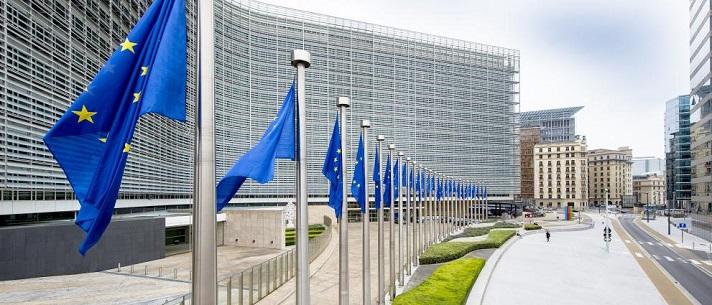
European Commission pledges €260 million to Gavi for 2026–2027 and over €200 million in add...
European Commission29 Sep 2024(Source: European Union)The European Commission announced a new funding pledge on 28 September of €260 million to Gavi, the Vaccine Alliance, for the years 2026–2027. The funds will contribute to Gavi\'s goal for 2030 to help protect 500 million children around the world, strengthen immunisation systems, and boost global health security by increasing readiness to respond to disease outbreaks.President of the European Commission Ursula von der Leyen said: \'A healthier world is a better world. And vaccination is one of our best chances for this. Right now, millions of children are still at risk. We must continue to support vaccination around the world to save lives. So today I am proud to pledge 260 million euros for Gavi, the Vaccine Alliance. And more will come.\'Chair of the Board of Gavi, José Manuel Barroso, said: \'Immunisation is a cornerstone of health security and vital to global equity. We deeply appreciate the EU\'s leadership, its partnership with Gavi supported countries matching their investment in vaccine costs, and enhanced commitment to Gavi’s mission which contributes to a safer, healthier world for all.\'In 2020, the EU pledged Gavi €300 million for the period 2021–2025. This pledge of €260 million concerns the first 2 years of Gavi\'s next strategic cycle which coincide with the last 2 years of the EU\'s current Multiannual Financial Framework (MFF) 2021–2027. The Commission will remain committed to a high level of ambition in supporting GAVI when designing its proposal for the next MFF. This will complement strong support to Gavi from EU Member States in a Team Europe approach.President von der Leyen also pledged €213 million in additional humanitarian aid for Africa, the Afghanistan crisis, Palestinians and Venezuela. The funding – currently subject to the approval of the Budgetary Authority – will contribute also to the fight against food insecurity in these regions. Of this total amount, €69 million will be allocated to Sudan and its neighbouring countries, in response to the dire humanitarian consequences of the Sudan war.Gavi, the Vaccine Alliance is the recipient of the 5th Sunhak Peace Prize.For more detailed information about Gavi, please refer to the link below.↓↓↓Gavi, The Vaccine Alliance
-
- 548
-
- 29 October 2024
-
![[Gavi, the Vaccine Alliance] Over 5 million girls in Tanzania to receive HPV vaccine to combat ce... 썸네일](http://sunhakpeaceprize.org/data/bbsData/17151443079.jpg)
[Gavi, the Vaccine Alliance] Over 5 million girls in Tanzania to receive HPV vaccine to combat ce...
22/04/24Gavi.orgThe Ministry of Health of the United Republic of Tanzania, in partnership with Gavi, the Vaccine Alliance (Gavi), UNICEF and the World Health Organization (WHO), today launched the national multi-age cohort (MAC) vaccination campaign against the human papillomavirus (HPV) – the leading cause of cervical cancer. The campaign, which is targeting over 5 million girls aged 9–14 years, will run from Monday, 22 April, to Friday, 26 April 2024.While cervical cancer remains a significant cause of death among women in Tanzania, with more than 10,800 cases and 6,800 deaths in 2022 alone, it is vaccine preventable. The HPV vaccine is safe and highly effective in preventing infections. During the campaign, eligible girls will have the opportunity to receive a single dose of the HPV vaccine at no cost.Efforts to increase access to the HPV vaccine across Tanzania have made substantial progress. In 2018, the two-dose vaccine was integrated into the national routine immunization programme for 14-year-old girls, demonstrating the government\'s commitment to safeguarding the health and well-being of future generations.To date, coverage of the first dose of the HPV vaccine has reached 79%, and the second dose is at 60%. Combined efforts are needed to ensure every girl in Tanzania receives crucial protection against this deadly yet preventable disease. Following the MAC campaign, the vaccine will continue to be provided routinely as a single dose to nine-year-old girls. It will go a long way towards increasing girls’ protection.Tanzania’s progress in administering the HPV vaccine is a critical part of a broader global initiative supported by the Vaccine Alliance, which has committed additional funding and resources towards reaching 86 million girls worldwide with the HPV vaccine by 2025.The campaign will leverage African Vaccination Week, synchronized with World Immunization Week (24 to 30 April), during which routine childhood vaccinations along with health education will be provided for girls in schools, health facilities and community centres countrywide.Throughout this week, the Ministry of Health, Gavi, UNICEF and WHO are urging communities to encourage girls to get vaccinated against cervical cancer and to aim for a future where no girl is burdened by this disease. *Gavi, the Vaccine Alliance is the recipient of the 5th Sunhak Peace Prize. For more detailed information about Gavi, please refer to the link below.↓↓↓Gavi, the Vaccine Alliance
-
- 1,124
-
- 8 May 2024
-
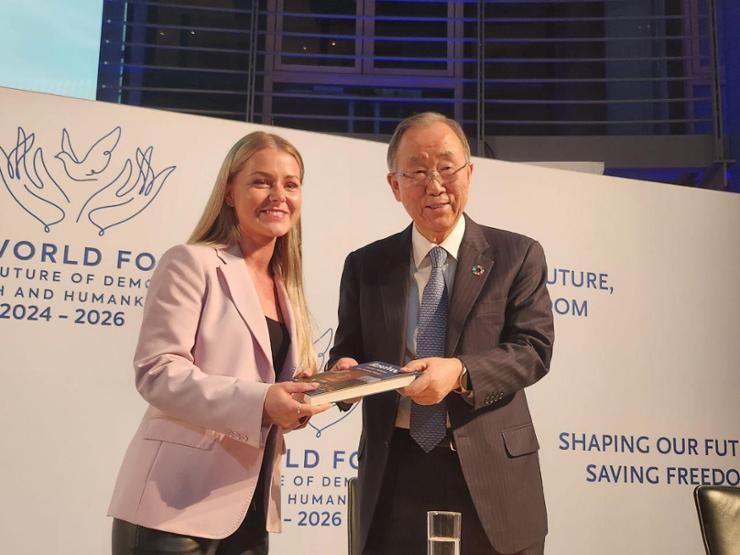
Documentary Screening of Former UN Secretary-General Ban Ki-moon Held in Berlin
Feb 20, 2024The Korea TimesBan Ki-moon, right, former U.N. secretary-general, gifts his memoir \"Resolved: Uniting Nations in a Divided World\" to an audience member during the world premiere of a documentary film on his life at the Allianz Forum in Berlin, Sunday (local time).\"The Quiet Diplomat,\" which follows the journey of Ban from his childhood during the 1950-53 Korean War and his meeting with former U.S. President John F. Kennedy as a teenager to his 10-year tenure as the first Korean to serve as U.N. secretary-general, was unveiled during the World Forum hosted by the Cinema for Peace Foundation.U.S. President Joe Biden sent a congratulatory letter, describing Ban and Hillary Clinton\'s receiving of the Cinema for Peace Award as \"a testament to (their) lifelong commitment to democracy and peace throughout the world.\" Yonhap
-
- 1,245
-
- 27 February 2024
-
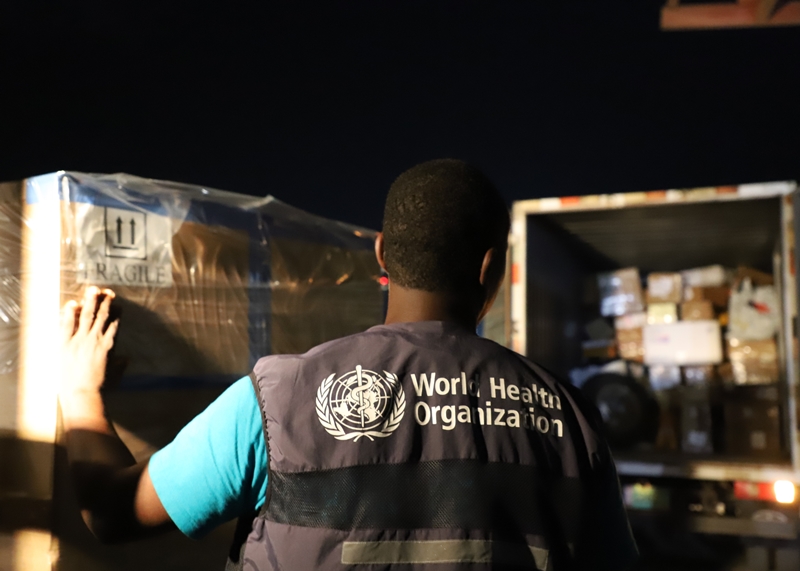
Ministry of Health, Gavi, WHO and UNICEF Announce Arrival of 112,000 Doses of Malaria Vaccine in ...
Jan 23, 2023 WHOThe Ministry of Health of Liberia, in collaboration with Gavi, the Vaccine Alliance, World Health Organization (WHO), and the United Nations Children\'s Fund (UNICEF), today announced the arrival of 112,000 doses of the RTS,S malaria vaccine- the first ever in Liberia. Studies have shown that children under five in Liberia experience high rates of malaria infection with a prevalence rate of 10%.[1] The Malaria vaccine marks a significant milestone in the fight against malaria, a preventable mosquito-borne disease that kills a child under age 5 every minute in Africa.\"The arrival of this life-saving vaccine is a game changer in our fight against malaria,\" said Adolphus Clarke, Director of the Expanded Programme on Immunization (EPI) at the Ministry of Health of Liberia. \"We are committed to ensuring that every child in Liberia has access to this vaccine and is protected from this deadly disease.\"The RTS,S vaccine was piloted in Ghana, Kenya, and Malawi since 2019 and has been shown to be safe and effective, reducing severe malaria by 30% and malaria deaths by 13%.\"This is a historic moment in the fight against malaria,\" said Fatima Babiker, the Gavi Senior Country Manager for Liberia. \"Gavi is proud to support the rollout of this life-saving vaccine to children in Liberia and across Africa. We are committed to working with our partners to ensure that every child has the chance to grow up healthy and free from malaria.\"WHO, UNICEF and Gavi are working closely with the Ministry of Health and other stakeholders ahead of the rollout of the malaria vaccine. WHO is providing technical guidance primarily focusing on epidemiological analysis to determine priority districts for roll out of the currently available doses, integration of the vaccine in routine immunization to boost wider uptake by the target group, and vaccine administration support to the targeted counties and districts, while UNICEF is procuring and delivering the vaccine doses to the Ministry of Health.\"The arrival of the malaria vaccine in Liberia is a testament to the power of global collaboration,\" said Dr. Clement Peter, WHO Liberia Representative. \"WHO is committed to working with our partners to ensure that this vaccine reaches all children who need it.\"\"This is a day of hope for millions of children in Africa,\" said Amadou Cisse, UNICEF Representative ai. \"UNICEF is proud to be part of this historic effort to bring the malaria vaccine to children in Liberia and across the continent. We are confident that this vaccine will save countless lives.\"The arrival of the malaria vaccine in Liberia is a major step forward in the fight against this deadly disease. With continued collaboration and support, the Government of Liberia will ensure that every child has the chance to grow up healthy and free from Malaria.The Ministry of Health of Liberia plans to start vaccination in April 2024.Notes : The RTS,S malaria vaccine is a vaccine that targets the Plasmodium falciparum parasite, the most deadly malaria parasite in Africa.
-
- 1,168
-
- 29 January 2024
-
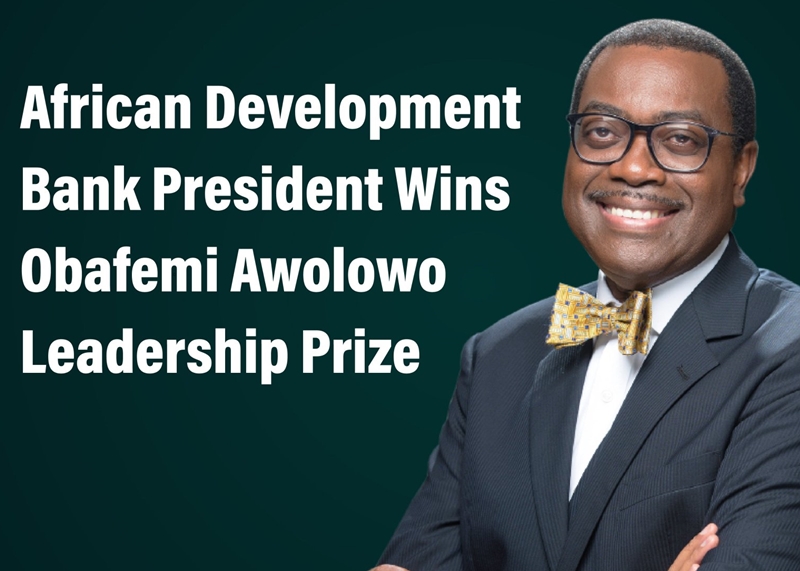
AfDB President, Adesina, wins Awolowo Leadership Award
December 22, 2023The Punch Newspaper(Source: ADBG)he President of the African Development Bank, Dr Akinwunmi Adesina, has been announced as the winner of the 2023 Obafemi Awolowo Prize for Leadership.The Chairman of the Selection Committee, Emeka Anyaoku, disclosed this at a press conference held in Gbagada Phase 2, Lagos State, on Thursday.Anyaoku said since the commencement of the Obafemi Awolowo Prize for Leadership in 2013, three distinguished personalities had so far been conferred with the award, saying Adesina would be the fourth recipient.According to him, the award was an initiative of the Obafemi Awolowo Foundation, which was set up in April 1992 to serve as the custodian of the late Chief Obafemi Awolowo’s intellectual and leadership legacy.He said the award “was established as an independent, non-profit, non-partisan organisation dedicated to immortalising the democratic and development-oriented ideals of Chief Obafeni Awolowo.”While describing Awolowo as a Pan-African nationalist of global repute, Anyaoku described the award as “a prestigious, biennial, international prize structured to follow a rigorous process of nomination and subsequent screening by a selection committee consisting of some of the most outstanding Nigerians.”In line with the relevant guidelines for the selection of candidates for the award, Anyaoku noted that nominations were received about many eminent persons who have made tremendous contributions in various spheres of life.“After a careful, detailed and rigorous screening process, the selection committee was unanimous in deciding the recipient of this year’s prize. I have great pleasure easure to inform you that the considered view of the selection committee is that, of all the nominees presented before it, the person adjudged to possess the attributes for the award to the highest degree and therefore, the recipient of the 2023 Obafemi Awolowo Prize for Leadership is Dr. Akinwunmi Ayodeji Adesina, CON, President of the African Development Bank,” he said.Adesina, a former Nigerian Minister of Agriculture in the administration of former President Goodluck Ebele Jonathan, was described by Anyaoku as “a Pan-Africanist with enthusiastic commitment to the positive transformation of the continent,” who he said had demonstrated core leadership qualities that had been associated with Chief Obafemi Awolowo, and which this prize is meant to encourage and reward.”As Minister of Agriculture in Nigeria, Anyaoku recalled that Adesina introduced innovative reforms such as the fertilizer sector reforms, “which virtually eliminated corruption in the sector and ensured that farmers actually benefitted from government’s subsidized fertilizers.“He developed a system that allowed farmers to receive electronic vouchers for seeds and fertilizers directly on their mobile phones, thereby cutting off the middlemen in the system. Not less than 15 million farmers benefitted from this scheme within four years.\\xa0“Since assuming office as President of the African Development Bank (AfDB). Dr. Adesina has worked relentlessly to contribute to the positive transformation of the continent. He has brought leadership to bear in addressing some of the challenges confronting the continent including leading and supporting innovative efforts to fight hunger and poverty.”It was disclosed that the award would be presented to Adesina on March 6, 2024, which is Awolowo’s birth anniversary.Speaking at the unveiling, Afenifere leader, Ayo Adebanjo, said Nigerians needed to stop supporting poor leadership and keep government on their toes.Adebanjo expressed concern that youths of nowadays turn supporters to “election riggers” the moment they are appointed as personal assistants.The nonagenarian said he had continued to fight for a better Nigeria because of the youths.“Those of us in the struggle today don’t stand to gain anything. I am still in the trenches at 95, to gain what? To send children to school or for what?”He vowed to fight the Nigerian cause till he breathed his last, saying he did not believe in parties that have no ideology.“A lot of those who are ruling you now are rogues personified,” he declared.
-
- 1,253
-
- 8 January 2024
-
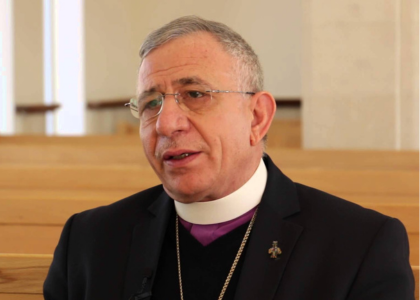
Bishop Munib A. Younan's Call for Peace and Justice in the Holy Land
Bishop Dr. Munib A. Younan, 2020 Sunhak Peace Prize Laureate, shares his heartfelt message from Jerusalem, addressing the ongoing conflict and violence in the Holy Land. He emphasizes the need for peace based on justice, the sanctity of every human life, and the importance of promoting reconciliation and human rights. His message calls for an end to violence, the illegal occupation, and a lasting solution that ensures peace, justice, and equality for both Palestinians and Israelis.What Does God Demand of You, but to do justice, and to love kindness and to walk humbly with your God? (Micah 6:8) A Word from a Palestinian Christian Bishop Dr. Munib A. YounanI write to you, dear friends, from the Holy City of Jerusalem. I write to you with anguish and grief as this Holy Land is gripped by yet another war threatening the wellbeing of all who call it home. The Hamas attack of October 7 and the resulting war have resulted in many statements about the tragic situation. Many of these statements are either pro or against one “side” or another. Some of the Western Christians are seeing the war through apocalyptic lenses, suggesting it is a religious war. Many of us who live in Jerusalem see it differently, praying with David: “I lift up my eyes to the hills; from where will my help come? My help comes from the Lord who makes heaven and earth” (Psalm 121:1). I speak to you as a Palestinian Christian Evangelical Lutheran bishop amid ongoing violence and the war on Gaza. Believing in the sanctity of every life regardless of gender, religion, ethnicity, political or denominational affiliation, I affirm that because every human bears God’s image, both Palestinians and Israelis have equal dignity. Jesus’ promise—“I came that they may have life, and have it abundantly” (John 10:10)—is for all. Every human being is loved by God and deserving of life with dignity. Our Holy Land is today stricken by the sin of violence, the sin of hatred, the sin of war, the sin of dehumanization, the sin of oppression, the sin of occupation and the sin of denying human rights to other humans. Amid this sin and the tragedy that results, the Church is called to speak a word. It must be a word that champions freedom, promotes responsibility, encourages justice, inspires hope, makes room for mercy and calls for accountability. As a Palestinian, I cry to you from Jerusalem: -enough of violence and killing of human lives that are created in God’s image -enough of hatred -enough of dehumanization -enough of using religion for political agendas -enough of violence -enough of illegal Israeli occupation -enough of bloodshed -enough of war (C) Mint We are people of life; we are never people of death. This is the reason, God meant that every human being whatever is their nationality or race must enjoy God’s given life with dignity, including full human rights. I always believed in a peaceful non-violent struggle. There will be a time when those who lead wars will be forgotten by history, but that peaceful, nonviolent believers will be written in the history books. Dr. Martin Luther King Jr, Archbishop Desmond Tutu, Mahatma Gandhi, Nelson Mandela, Bishop Zephania Kameeta, Bishop Manas Buthelezi, Dorothy Day, Mother Teresa, Archbishop Romero and many others challenged injustice, racial discrimination, and colonialism with the power of the word. I have always believed in a peaceful, nonviolent struggle for justice. They spoke truth to power and have given a true vision for justice, peace, living together, harmony, equity, and reconciliation. They interpreted the teachings of religious tradition to promote love of the neighbor, even going as far to love the neighbor by protecting their human rights. While those in power were disturbed, these leaders guided their people in times of injustice and wars to see that peace based on justice is stronger than any war, oppression, racial discrimination or violence. Dr Martin Luther King Jr’s wise words still ring in our ears: “Returning hate for hate multiplies hate, adding deeper darkness to a night devoid of stars. Darkness cannot drive out darkness; only light can do it. Hate cannot drive out hate, only love can do it.” Even in catastrophic events when too many Palestinians and Israelis are killed, the light of God shines in our hearts. According to today’s numbers, in past few weeks, more than 1400 Israelis and over 10 000 Palestinians have been killed. These figures include approximately 4000 children, as well as medical personnel and international aid workers. I unequivocally condemn any killing of civilians, both Israelis and Palestinians. Even in these dark days, we can never allow hatred to consume us. We instead carry the light of peace based on justice for the sake of all people living in this Holy Land. The peoples of this land are tired to live through another war every eighteen months; another attack, another revenge and another counter revenge. Our people ask: why does not God hear our prayers for peace based on justice? We have prayed for 75 years, including 56 years of illegal occupation. Why does not God hear us? The story of Exodus teaches us that God hears the groaning of the people and the prayers of the oppressed (Exodus 2:24). (C) UNICEF God hears our prayers, our yearning for freedom and justice. It seems, however, that the Pharaohs of the world still do not. As in Exodus, their hearts are hardened and they do not see the truth or seek the liberation of every nation. The western powers are among those Pharaohs and are equally responsible for where we are today. They have heard neither the cries of occupied Palestinians nor the cries of many peace-loving Israelis. They care only for their political power, arms sales and economic interests, not for justice in the Holy Land. Together, we must call on these worldly powers to immediately stop this war in Gaza. The attack in Israel and the war in Gaza must be the last ones in Palestine and Israel. If only the world leaders would invest half as much money and energy into peacemaking as they invest in war. It is time to end violence over the Holy Land. It is time to end Israel’s illegal occupation of Palestinian territories along with all of Israel’s unjust policies against Palestinians. It is time to establish two states solution where the State of Palestine along 1967 borders will live with State of Israel in peace, justice, equity, and equality. Christians in the Holy Land are disappointed to see some Christians elsewhere using biblical interpretations that justify Palestinian suffering. Christians believe that the fulfillment of prophecy has been in Jesus Christ alone. People should therefore not use the Old Testament texts to identify the present situation with biblical events. The Palestinian-Israeli conflict is neither religious, nor biblical, nor eschatological. It is a modern conflict about the colonization of land. It must be seen as political conflict that needs a political solution achieved through the just application of United Nations resolutions and international law. In the Appeal for a just and lasting peace in the Holy Land published on Oct 19, 2023, and written by the Roman Catholic Patriarch Emeritus Michel Sabbah, The Anglican Bishop Emeritus Riah Abu Assal, Orthodox Archbishop Atallah Hanna and myself : “We appeal to the UN an international community and those who consider themselves friends of Israel and Palestine, to use your influence to stop the ethnic cleansing, implement the rule of international law and uphold the fundamental human rights of Palestinians as well as Israelis, to live as equals with justice, dignity and security in their historic lands.” Additionally, the Sabeel Center for Liberation Theology has said: “The non-violent majority of Palestinians, along with our Israeli and International friends, should continue to harness creativity and courage as the primary tools, and it is imperative for all who seek liberation, justice and peace in Palestine and Israel to uplift and support each other.” HH Pope Francis has said: “The Middle East does not need war but a peace built on justice, dialogue and the courage of fraternity.” Let us also be mindful of the recently departed former President of the Republic of Finland, Mr. Martti Ahtisaari, who said in his speech for the Noble Peace Prize: “We cannot go on, year after year, simply pretending to do something to help the situation in the Middle East.” He knew that while “religion has been used as a weapon or as an instrument for prolonging the conflict,” they can “also be a constructive force in peacebuilding.” Following President Ahtisaari’s lead, we must draw on every possible resource to seek peace based on justice in Palestine and Israel, and also for the Middle East as a whole. We must honor these calls for peace by demanding an immediate cessation of the war and all the atrocities in Gaza, allowing the humanitarian aid to enter Gaza. Do not allow extremists to determine the path forward. Instead, urge the international community to hold an international conference where Palestinians and Israelis negotiate all final status issues. Now is the Kairos for justice in Palestine and Israel. As a Palestinian Christian friend who spent many formative years in Finland, please hear me when I say I ask you to be neither pro-Palestinian nor pro-Israeli. I instead ask you to be pro-truth, pro-life, pro-justice, pro-freedom, pro-peace, and pro-reconciliation. I ask you to pray for all victims of the attack and the resulting war, for all the bereaved, for all the injured, for all the traumatized, for all the prisoners of war, for all the displaced, for all whose homes were demolished, for all the children that live in fear. Please pray that God may touch the minds of the politicians to work for justice in Palestine and Israel so we can realize the vision of St. John, who wrote that “God will wipe every tear from their eyes. There will be no more death or mourning or crying or pain, for the old order of things has passed away” (Revelation 21:4). God bless you. Bishop Dr. Munib A. Younan Bishop Emeritus of the Evangelical Lutheran Church in Jordan and the Holy Land Former President of the Lutheran World Federation The Honorary President of Religions for Peace International
-
- 2,498
-
- 9 November 2023
-
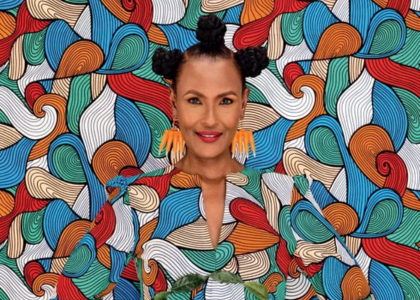
Waris Dirie Features in the 2024 Lavazza Calendar, "More Than Us."
Waris Dirie, the renowned Somali-born supermodel, writer, and unwavering anti-female genital mutilation (FGM) activist, features prominently in the 2024 Lavazza Calendar, \"More Than Us,\" celebrating Africa through photography. This collaboration highlights not only her captivating beauty but also her resolute commitment to an important cause. While her remarkable journey from the Somali desert to international runways is well-known, Dirie\'s true impact lies in her fight against FGM through the Desert Flower Foundation. In a recent interview with \'La Republica,\' she emphasized the role of education in combating this brutal practice, noting global progress in awareness and FGM reduction. However, Dirie cautioned that the fight is far from over, particularly in Europe, where FGM often remains concealed. She advocated for stricter laws and medical safeguards for at-risk girls. Dirie\'s return to the world of modeling in the context of the Lavazza Calendar symbolizes the resilience of African women. She proudly represents them in a project that acknowledges their contributions and strength.Source: 2024 Lavazza Calendar
-
- 2,162
-
- 25 October 2023
-

Ban Ki-moon urges compliance with the laws of war in Gaza
Ban Ki-moon, Deputy Chair of The Elders and former UN Secretary-General, said: \"The killing of Israeli citizens and hostage taking by Hamas are shocking war crimes. But any military operation by Israel must be limited in scope, compliant with the laws of war, and take all possible measures to protect civilians. Israel responding to the atrocities committed by Hamas with more war crimes will generate more hatred and violence against Israelis. At this terrible time, I urge all parties to remember their common humanity. Palestinian and Israeli lives are of equal worth.\"
-
- 1,325
-
- 24 October 2023
-

Africa’s ‘optimist-in-chief’ on the continent’s renaissance: ‘Don’t just believe me,...
In an exclusive interview with The Guardian, Akinwumi Adesina, President of the African Development Bank (AfDB), shares his optimism about Africa\'s prospects and the need to dispel misconceptions. This insightful discussion took place ahead of the World Bank meetings in Morocco, where Adesina highlighted key factors shaping Africa\'s path forward. Adesina emphasized Africa\'s demographic advantage, pointing to its youthful population as a valuable global workforce. He stressed the importance of moving away from raw material exports and focusing on adding value through participation in global value chains, a shift that promises economic growth and prosperity. The AfDB, founded in 1964 and Africa\'s sole AAA-rated financial institution, aligns its goals with Adesina\'s \"high fives.\" These priorities encompass universal electricity access, improving quality of life, fostering industrialization, achieving food self-sufficiency, and integrating Africa\'s 54 countries to create more robust markets. Adesina also discussed the bank\'s recent achievements, including a significant increase in capital from its shareholders, enabling it to swiftly respond to crises like the COVID-19 pandemic and food shortages resulting from geopolitical events. At the heart of Adesina\'s message is a call for fairer international financial systems, ensuring African nations receive equitable access to reserves and liquidity. He will advocate for this at the World Bank summit. Adesina challenged the perception of corruption in Africa, highlighting the importance of transparency, accountability, and responsible resource management. He cited examples of countries like Eritrea, where corruption is minimal, and emphasized the AfDB\'s commitment to good governance. Lastly, Adesina addressed the urgent climate crisis, urging increased climate finance for Africa, which experiences substantial annual losses due to climate change impacts. He also advocated for reevaluating Africa\'s wealth based on its natural capital, emphasizing the continent\'s role in providing global environmental benefits. In closing, Adesina\'s optimism is grounded in data, as reflected in Africa\'s low default rates on infrastructure investments, setting the stage for global investments to land successfully on the continent.
-
- 1,367
-
- 17 October 2023
-
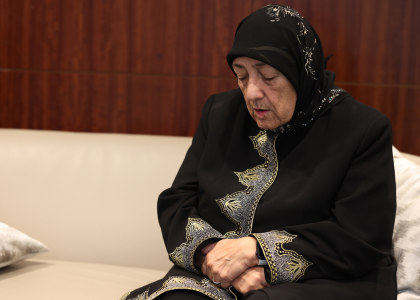
Dr. Sakena Yacoobi Urgently Appeals for Support as Afghanistan Grapples with Earthquake Aftermath
(© REUTERS)Dr. Sakena Yacoobi, the Founder and Executive Director of the Afghan Institute of Learning (AIL), has issued an urgent appeal for international assistance in the wake of a devastating earthquake that struck Herat and nearby provinces in Afghanistan on October 7th. The natural disaster has exacerbated an already dire humanitarian situation in the country, leaving thousands dead and many more without homes or basic necessities. AIL has been actively providing aid in the form of shelter, medical care, and food, but the scale of the disaster necessitates a larger, international response. (© UNICEF)Dr. Yacoobi emphasizes that Afghanistan is in a state of \"unimaginable crisis,\" worsened by ongoing conflict, displacement, and economic instability. She urges donors, philanthropic organizations, and governments worldwide to provide immediate and substantial support to help the affected communities recover. AIL has a 30-year history of serving Afghan communities, particularly in the fields of education and healthcare for women and children, and is now leading the relief efforts in the earthquake-hit areas. Your support, Dr. Yacoobi says, can make a meaningful difference in alleviating suffering and aiding recovery.Donate to Sakena Fund
-
- 1,408
-
- 12 October 2023
-
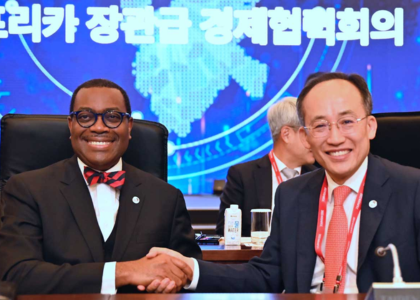
Akinwumi Adesina Urges Stronger Korea-Africa Collaboration at KOAFEC Conference
In the bustling city of Busan, South Korea, an echo for strengthened ties and unified strides toward sustainable future resonated prominently as the 7th Korea-Africa Economic Cooperation (KOAFEC) Ministerial Conference commenced. The call for solidarity was led by Akinwumi Adesina, the President of the African Development Bank Group, as he encouraged delegates to harness the conference as a pivotal juncture to catalyze support for Africa\'s transformation into a global breadbasket and a hub of universal energy access. Adesina highlighted the pressing need to galvanize additional resources for the attainment of these lofty goals. A key facet of this ambition involves the prospective reallocation of the International Monetary Fund\'s Special Drawing Rights (SDRs) to the African Development Bank, a move he posits could potentially be a \"game changer for Africa\'s development\". He passionately called upon Korea to align with other countries in contributing to this pivotal reallocation, which promises to spearhead unprecedented development in Africa. As discussions unfolded at the conference, co-hosted by the African Development Bank Group and the Ministry of Economy and Finance of the Republic of Korea, the air was charged with anticipation and optimism for the mutually beneficial partnerships on the horizon. The theme of the event, “Embracing a Sustainable Future: Just Energy Transition and Agricultural Transformation in Africa,” echoes the critical development priorities of the continent, setting the stage for a synergy between Korea\'s technological prowess and Africa\'s vibrant young demographic and abundant resources. Emphasizing the considerable untapped agricultural potential of the continent, Adesina remarked, \"Africa must be a solution to feeding the world, as it has 65% of the uncultivated arable land left in the world.\" He underscored that Africa\'s trajectory in the agricultural sector would play a decisive role in shaping the global food landscape in the coming years. The conference also served as a platform for the unveiling of several collaborative initiatives, including the Korean government\'s K-Rice Belt project which aims to assist eight African nations in cultivating 30 million tons of rice. This initiative resonates with the African Development Bank’s Feed Africa strategy and echoes the outcomes of the Dakar 2 Food Summit held earlier this year, both endeavoring to lead Africa to food self-sufficiency within a half a decade. Addressing the energy crisis that plagues the continent, where nearly 600 million individuals lack access to electricity, Adesina underscored Africa\'s vast renewable energy potential. He highlighted that the continent is home to an impressive 11 terawatts of solar potential, of which only a fraction is currently utilized. Despite the significant strides in renewable energy investments, Adesina cautioned against an exclusive reliance on renewables due to their inherent variability, advocating for a judicious utilization of Africa\'s newly discovered abundant natural gas resources as part of a balanced energy portfolio. The African Development Bank, under Adesina\'s stewardship, has embarked on an ambitious journey to foster collaborations with global partners in fostering a just energy transition. This involves substantial partnerships with nations including the European Union, the United States, the United Kingdom, Germany, and France, focusing on sustainable energy initiatives in African nations like South Africa and Senegal. As the conference drew to a close, Adesina\'s optimistic note left an indelible mark on the attendees. He envisaged a radiant future for Africa, powered by a robust partnership with South Korea. Together, they aspired to forge a path of accelerated growth and development, working hand in hand to realize a vision of a prosperous, self-sufficient, and sustainable Africa, making strides toward a brighter tomorrow for all its inhabitants.
-
- 1,368
-
- 21 September 2023
-
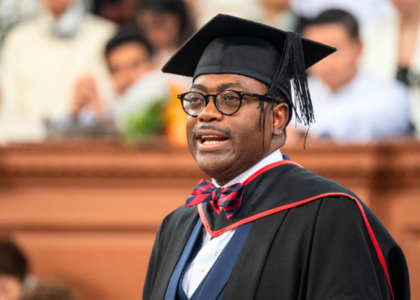
Akinwumi Adesina calls on Oxford MBA graduating class to be change-makers
In the 2023 commencement address at Oxford University\'s Saïd Business School, the African Development Bank President, Dr. Akinwumi Adesina, urged the graduating MBA students to apply their newly acquired skills and knowledge to address pressing global issues such as climate change and world hunger. He emphasized the unacceptable reality of 2.3 billion people facing hunger daily and underscored the graduates\' responsibility as change-makers equipped with world-class education. He highlighted various global challenges, including the lack of access to essential amenities such as electricity, clean water, sanitation, and basic financial services that billions face worldwide. Adesina urged graduates to work towards ensuring a better future for the 244 million children not attending school, including 129 million girls. Adesina insisted on the need for a restructured global financial system to address these challenges more effectively and urged the graduates to lead efforts in directing the $145 trillion managed by global pension funds and institutional investors towards the collective good. He also encouraged them to be selfless, promote transparency and inclusion, and avoid corporate greed\'s corruptive influences.In addition to Adesina, Saïd Business School faculty members encouraged the graduates to dream big, take up leadership roles, and make positive impacts in the world. They were also advised to forge their paths confidently, while promoting unity and addressing global issues such as the looming new Cold War and global warming.At the end of the event, Adesina engaged with some of the African graduates, discussing leadership, the future of Africa, and the role of youth in its development.
-
- 1,521
-
- 20 September 2023
- Sunhak Peace Prize
-
Future generations refer not only to our own physical descendants
but also to all future generations to come.Since all decisions made by the current generation will either positively
or negatively affect them, we must take responsibility for our actions.

